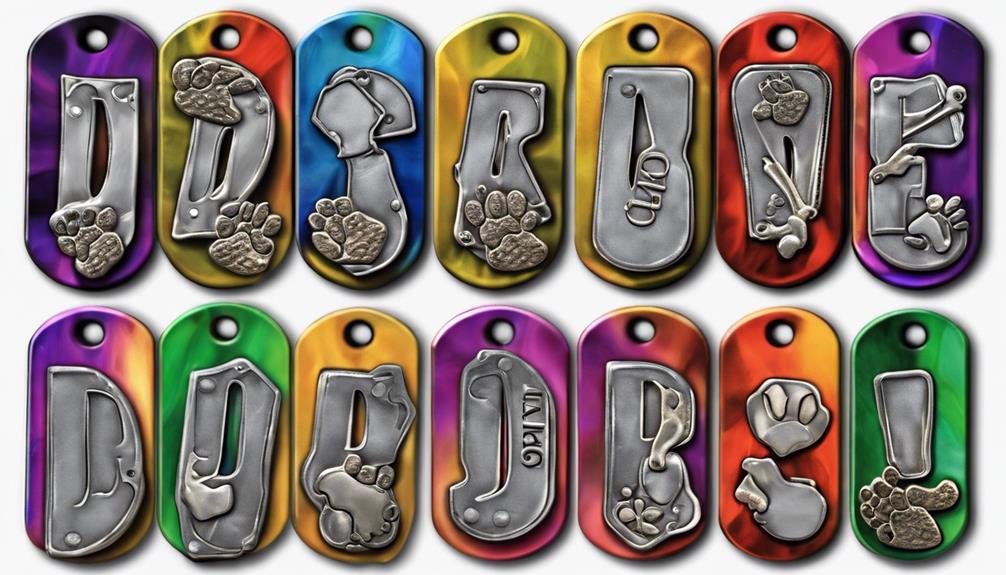When you are crate training your 8-week-old puppy, it is important to establish a routine that aids in house training, behavior management, and provides comfort for your pet. Begin by selecting the correct size crate, making it comfortable with a soft blanket, and locating it in a calm area. Develop a schedule that includes potty breaks every two hours, playtime, naps, and time for your puppy to explore the open crate. Remember to use high-value treats and be patient in helping your puppy adjust positively.
Join us for valuable tips and common challenges to guarantee successful crate training for your little companion.
Key Takeaways
- Start with short crate sessions to avoid overwhelming the puppy.
- Schedule potty breaks every 2 hours to prevent accidents.
- Incorporate playtime and naps to balance crate time.
- Use treats and toys to create positive associations with the crate.
- Gradually increase crate time to build comfort and routine.
Benefits of Crate Training for Puppies
Crate training offers numerous benefits for puppies, aiding in house training, preventing bad behavior, and promoting a sense of security in their own space. When introducing a new puppy to a crate, it's important to create a positive association with this safe space.
Using the crate as a tool for potty training a puppy teaches them bladder control and helps avoid accidents in the house. Additionally, the crate serves as a sanctuary for the puppy, assisting in preventing destructive behavior when left unsupervised.
By providing a secure environment for downtime and relaxation, crate training helps curb potential separation anxiety in puppies. This safe haven not only encourages good behavior but also gives the puppy a place to retreat when feeling overwhelmed, fostering a sense of security and well-being.
Establishing a Crate Training Schedule
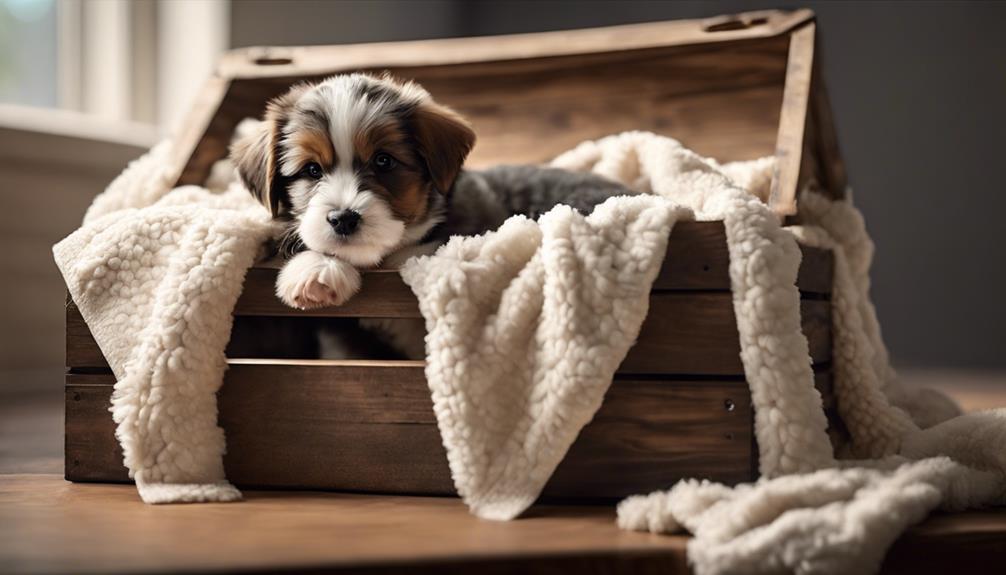
Let's focus on setting up a crate and establishing a consistent routine for your 8-week-old puppy.
By creating a safe and comfortable space, your puppy will gradually learn to enjoy their crate.
Implementing a structured schedule will help your puppy feel secure and adapt to their new environment.
Setting up Crate
To establish a successful crate training schedule for your 8-week-old puppy, consider the following steps for setting up the crate:
- Choose the Appropriate Crate Size: Make sure the crate allows your puppy to stand up, turn around, and lie down comfortably.
- Add Comfort: Place a soft blanket or towel inside the crate for added comfort.
- Location Matters: Position the crate in a central, quiet area of your home.
These steps are important in creating a safe and cozy space for your puppy. By following these guidelines, you'll help your puppy associate the crate with positive experiences, making the training process smoother and more effective.
Consistent Routine
Establishing a consistent routine is pivotal in successfully crate training your 8-week-old puppy. Creating a schedule that includes regular feeding times, potty breaks, structured nap times, and overall routine helps your puppy adjust and learn expectations.
By providing a structured environment within the crate, your puppy feels secure and understands the order of the day. Consistency is key to helping your puppy anticipate what comes next and feel comfortable in the training process.
Keep the schedule as consistent as possible to aid in potty training and overall behavior development. Be prepared to adjust the routine as needed but maintain the core structure to help your puppy thrive in crate training.
Introduction to Crate Training
Introducing a crate to your 8-week-old puppy creates a secure and comforting den-like space essential for their well-being and training. When beginning crate training, it's vital to approach it with care and patience. Here are key points to keep in mind:
- Gradual Introduction: Start by placing the crate in a common area where your puppy can see and sniff it without any pressure to enter.
- Positive Association: Encourage your puppy to explore the crate by placing treats, toys, or familiar bedding inside to create a positive association.
- Short Periods: Initially, keep the crate door open and allow your puppy to enter and exit freely, making sure to keep the interactions brief to prevent any stress.
Sample Crate Training Schedule
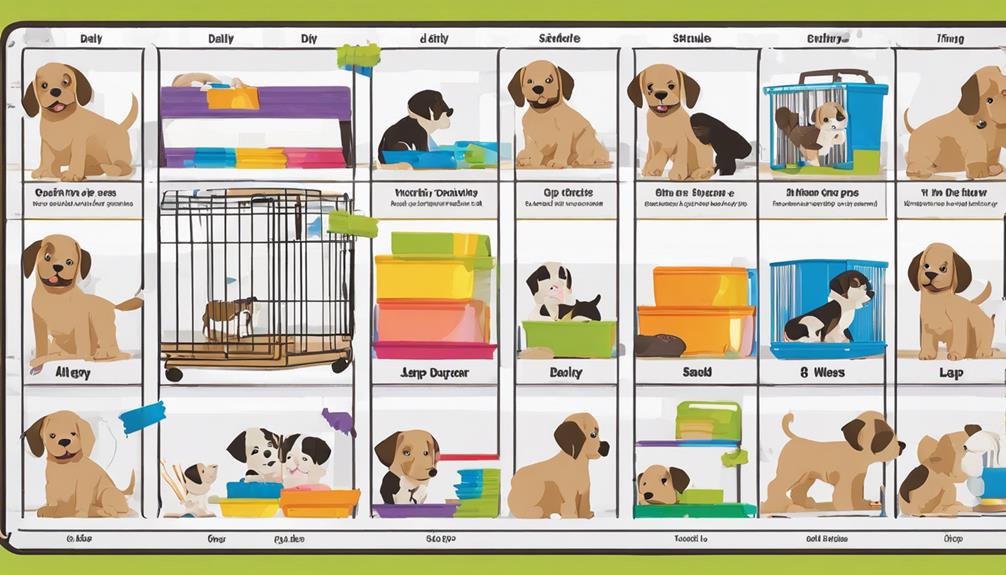
When implementing a sample crate training schedule for your 8-week-old puppy, it's crucial to take into account their specific needs and abilities at this young age.
At this stage, an 8-week-old puppy typically has limited bladder control and can hold its bladder for about 2 hours. To create a positive association with the crate, introduce it gradually, allowing the puppy to explore and feel comfortable inside.
Establish a schedule that includes potty breaks every 2 hours during the day to aid in potty training. Integrate playtime and nap time within the crate schedule to provide a balanced routine.
It's essential to keep the crate open when the puppy isn't inside, encouraging exploration and creating a safe space for rest.
Tips for Successful Crate Training
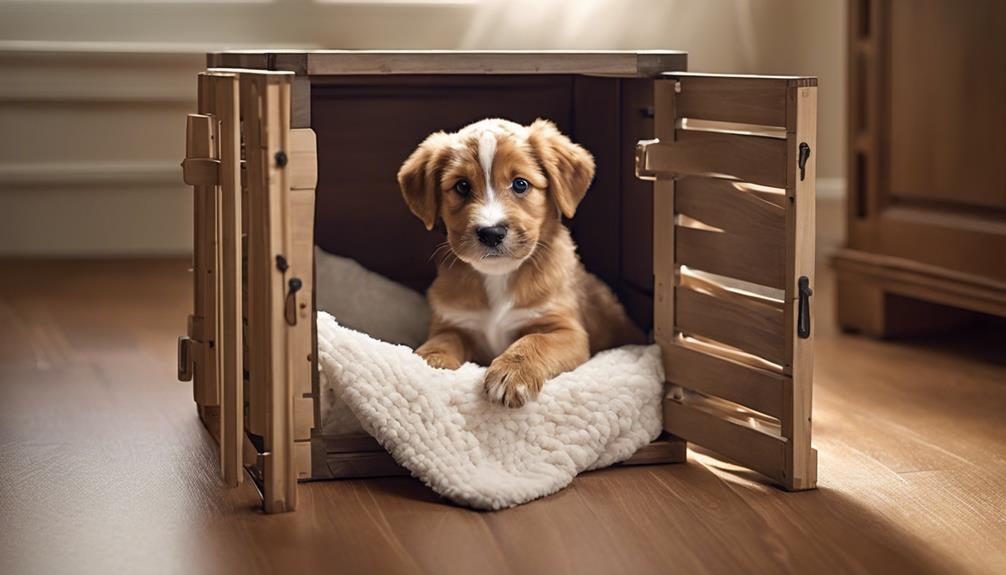
To guarantee successful crate training for your 8-week-old puppy, gradually introduce the crate to establish a positive association with the space. Here are some tips for successful crate training:
- Use high-value treats: Encourage your puppy to enter the crate willingly by offering delicious treats that they love.
- Create a cozy space: Make the crate inviting by adding a soft blanket or towel for comfort, turning it into a safe and snug den-like environment.
- Allow exploration: Initially, leave the crate open during the day for short periods, allowing your puppy to explore and get comfortable with the space at their own pace.
Common Challenges in Crate Training
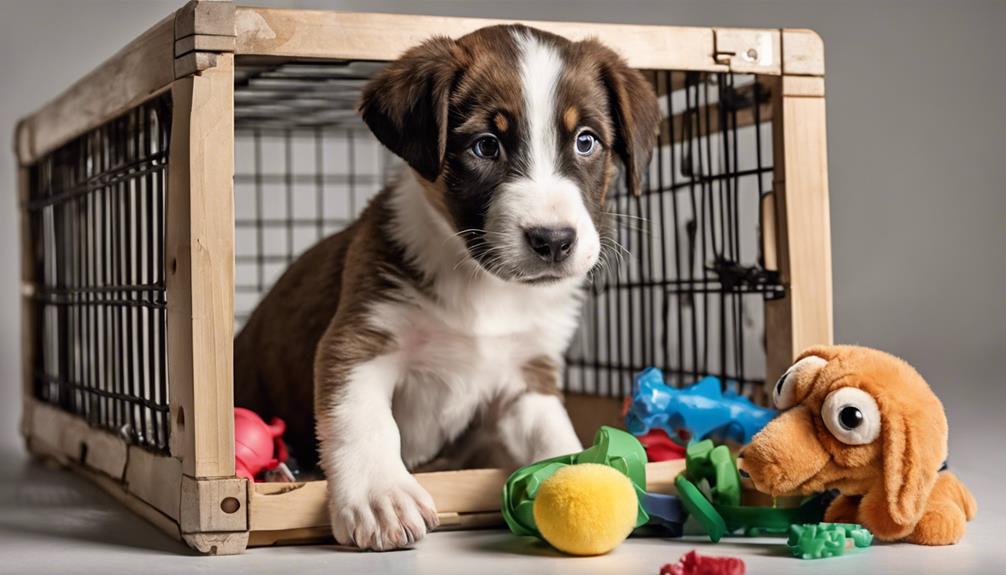
Facing common challenges in crate training can be a natural part of acclimating your 8-week-old puppy to their new environment. Puppies may initially show resistant behavior when introduced to the crate, often manifesting through whining or barking.
Accidents inside the crate can occur if the puppy isn't taken out frequently enough for potty training. Additionally, some puppies may display anxious behaviors or attempt to escape from the crate, making the training process more challenging.
Overcoming these obstacles requires consistency, patience, and positive reinforcement. Consistently following a crate training schedule, being patient with your puppy as they adapt, and rewarding good behavior with treats or praise can help address these common challenges effectively.
Frequently Asked Questions
How Much Time Should I Crate My 8 Week Old Puppy?
We should crate an 8-week-old puppy for a maximum of 2 hours during the day. Following the guideline of the puppy's age in months plus one helps prevent accidents and anxiety. Consistent crating schedules aid in routine adaptation.
What Is a Good Schedule for a 8 Week Old Puppy?
We establish a balanced routine for an 8-week-old puppy, ensuring consistent potty breaks every 1-2 hours, limited crate time of 1-2 hours, and adjustments based on pup's signals. Our focus is on the puppy's comfort, needs, and training progress.
Can an 8 Week Old Puppy Sleep Through the Night in a Crate?
We can't expect an 8-week-old puppy to sleep through the night in a crate without needing bathroom breaks. Their limited bladder control means they may need to go out at least once. Gradually extend the duration between breaks as they grow.
Can I Leave My 8 Week Old Puppy in a Crate for 2 Hours?
Yes, we can leave an 8-week-old puppy in a crate for up to 2 hours. Puppies at this age have limited bladder control and need frequent potty breaks. Crating for longer periods may lead to accidents.
What is the Importance of Crate Training for an 8-Week-Old Puppy at Night?
Crate training schedule for a puppy is essential for an 8-week-old to establish a routine and teach them bladder control. It provides a safe space and helps minimize accidents at night. The consistent schedule helps with obedience and reduces anxiety, making it a crucial aspect of early puppy training.
Conclusion
In summary, crate training your 8-week-old puppy is vital for their development and overall well-being.
By following a consistent schedule, introducing them to the crate gradually, and using positive reinforcement, you can help your puppy feel safe and secure in their new environment.
Remember, Rome wasn't built in a day, so be patient and persistent in your training efforts.
After all, practice makes perfect, and a well-trained puppy is worth their weight in gold.


